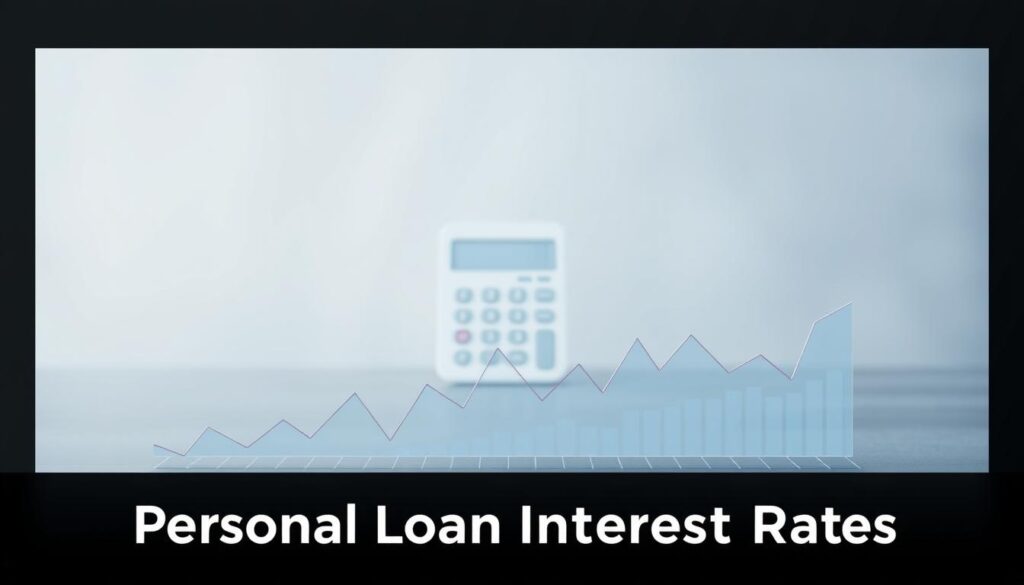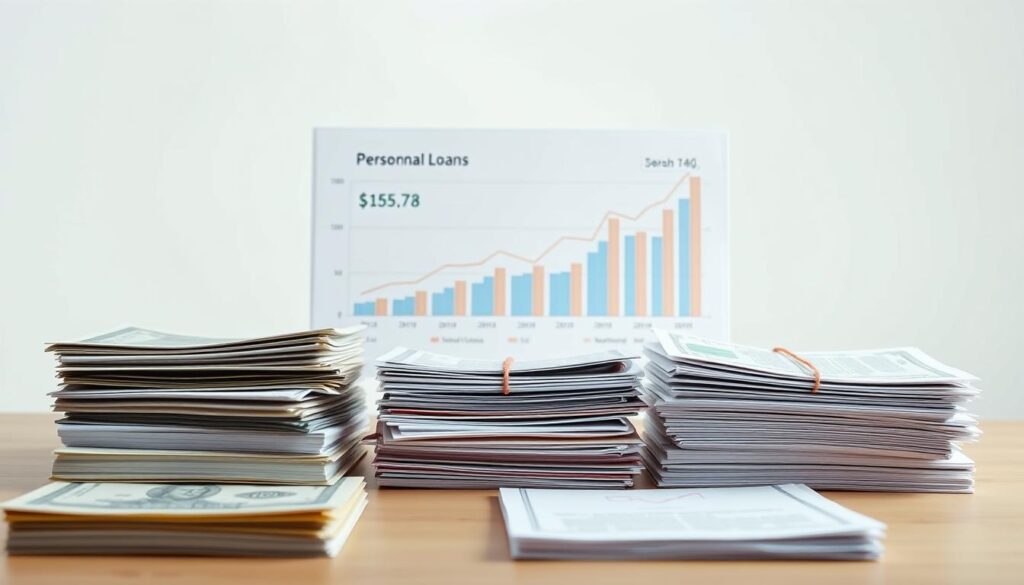Secure Personal Loans for Your Financial Needs
Did you know that nearly 30% of Americans have some form of debt? Personal loans are a big part of that.
For many, getting money fast is key. That’s where secured personal loans come in. They offer a good way to get financial help.
By using something of value as collateral, borrowers can get loans with better terms. Even if their credit isn’t perfect. NerdWallet says the best secured loans don’t need high credit scores.
We’ll look at how secured personal loans can help with your financial needs. We’ll cover their benefits and how they work.
Key Takeaways
- Secured personal loans allow borrowers to pledge collateral in exchange for borrowed money.
- They are a good option for those with bad credit or needing quick access to funds.
- The best secured loans have low minimum credit score requirements.
- These loans can offer more favorable terms compared to unsecured loans.
- Borrowers should be aware of the risks of losing collateral if they default.
What Are Personal Loans and How Do They Work?
Personal loans are a flexible way to meet different financial needs. We’ll cover what personal loans are, their uses, and how lenders decide who gets them.
Definition of Personal Loans
A personal loan is a unsecured loan for many needs, like paying off debt or fixing up your home. They don’t need collateral, making them easier to get.
Common Uses for Personal Loans
Personal loans are great for many things, such as:
- Debt consolidation
- Home improvement projects
- Major purchases or expenses
- Covering unexpected costs
Eligibility Criteria and Requirements
To get a personal loan, lenders look at several things, like:
| Eligibility Factor | Description | Importance Level |
|---|---|---|
| Credit Score | A measure of your creditworthiness, indicating how likely you are to repay the loan. | High |
| Income Level | Your income is assessed to ensure you have the financial capacity to repay the loan. | High |
| Employment History | A stable employment history can positively impact your eligibility. | Medium |
| Debt-to-Income Ratio | This ratio helps lenders understand your ability to manage additional debt. | High |
Knowing these criteria can help you make a stronger loan application. Lenders also look at your credit history and other financial commitments when considering a low interest personal loan.
Types of Personal Loans Available
It’s important to know the different types of personal loans. This helps you choose the right one for your financial needs. Personal loans vary to meet different financial situations.
Unsecured Personal Loans
Unsecured personal loans don’t require collateral. This means you don’t risk your assets to get the loan. Lenders look at your credit score and history to decide if you can repay.
- These loans are quick to get and safe for you.
- But, they might have higher interest rates because lenders take more risk.
Secured Personal Loans
Secured personal loans need collateral, like a car or house. This makes lenders feel safer, which can lead to better loan terms.
- They often have lower interest rates and you can borrow more.
- But, you could lose the collateral if you can’t pay back the loan.
Debt Consolidation Loans
Debt consolidation loans help you combine multiple debts into one. They usually have a lower interest rate and one monthly payment. This can make managing your finances easier and save money on interest.
- They simplify managing many debts.
- They can lower your monthly payments and interest over time.
Choosing the right personal loan depends on your financial situation, credit score, and what you prefer. Knowing about the different types of personal loans helps you make a better choice that fits your financial goals.
Benefits of Choosing Personal Loans
Personal loans come with many benefits. They offer flexible use and competitive interest rates. These loans are great for many needs, like paying off debt or buying big items.
Flexible Usage
Personal loans let you use the money as you see fit. This is super helpful for covering different expenses.
Competitive Interest Rates
Personal loans have competitive interest rates. They often beat credit card rates. LendingTree says secured loans might have even lower rates, which is good for those with collateral.
Quick Access to Funds
They also give you quick access to funds. This is key for urgent financial needs or making on-time payments. The fast application and approval process means you get the money fast.
| Loan Type | Interest Rate | Processing Time | Flexibility |
|---|---|---|---|
| Secured Personal Loan | 6.99% – 8.99% | 3-5 business days | High |
| Unsecured Personal Loan | 8.99% – 12.99% | 3-5 business days | High |
| Credit Card | 14.99% – 24.99% | Immediate | Medium |
In summary, personal loans are a great choice. They offer flexible use, good interest rates, and quick access to money. This makes them a solid option for many financial needs.
How to Apply for a Personal Loan
Applying for a personal loan online is now easier and more convenient. The steps are simple and can help you get the funds you need.
Researching Lenders
Start by researching lenders. Look at banks, credit unions, and online lenders for online personal loans. Compare their interest rates, loan terms, and what you need to qualify.
Consider the lender’s reputation, customer service, and any extra fees. Some focus on bad credit personal loans for those with lower credit scores.
Preparing Your Application
After picking a lender, prepare your personal loan application. You’ll need documents like proof of income, ID, and bank statements. Having these ready makes the process smoother.
Check your credit report and score before applying. It affects your interest rate and approval. If your score is low, look for lenders that offer bad credit personal loans.
Filling Out the Loan Application
Fill out the loan application carefully. Provide all needed information truthfully. Most lenders have an online application, making it easy to apply from home.
When applying, share details about your job, income, and debts. The lender will use this to decide your loan terms.
- Ensure all information is accurate and up-to-date.
- Double-check your application for any errors before submission.
- Understand the terms and conditions of your loan before accepting.
Important Factors to Consider Before Borrowing
Before you take out a personal loan, it’s key to look at several important factors. Borrowing money is a big decision. Knowing what to consider can help you make a smart choice.
Loan Amount and Terms
First, think about the loan amount and its terms. Only borrow what you really need. This can help avoid too much debt. The loan term, or how long you have to pay it back, is also important.
Longer terms might mean smaller monthly payments. But, you could end up paying more in interest over time. Always check the loan terms, including any flexibility in repayment and any penalties for paying off early.
Interest Rates and Fees
Interest rates and fees can greatly affect the cost of borrowing. NerdWallet says secured loans often have lower rates than unsecured ones. It’s smart to compare rates from different lenders to find the best deal.
Don’t forget to look at the fees too. This includes origination fees, late fees, and penalties for paying off early. Knowing these costs can help you avoid surprises.
Repayment Period
The repayment period is another key factor. A longer period might make payments easier, but you’ll pay more in interest. A shorter period means higher payments but less interest.
Choose a repayment period that fits your budget and financial goals. Making a budget can help you figure out how much you can afford each month.
By carefully looking at loan amount, interest rates, and repayment period, you can make a better choice. Always think about your financial situation and goals before taking a loan.
- Assess your financial needs and goals.
- Compare loan offers from multiple lenders.
- Carefully review the loan terms and conditions.
- Consider seeking advice from a financial advisor.
Understanding Interest Rates on Personal Loans
Personal loan interest rates change based on your credit score. Knowing how these rates work is key to managing your loan well.
Interest rates on personal loans can be fixed or variable. A fixed interest rate stays the same, making your payments predictable. But, a variable interest rate can change, possibly altering your payments.
Fixed vs. Variable Interest Rates
Choosing between fixed and variable rates depends on your financial situation. Fixed rates are stable, while variable rates might start lower but could rise.
For example, a fixed rate loan might have an 8% interest rate for the whole term. But, a variable rate loan could start at 7% and change with the market.

How Your Credit Score Affects Rates
Your credit score greatly influences the interest rate you get. Those with good scores often get lower rates because they’re seen as less risky.
LendingTree shows that better credit scores lead to lower rates. For instance, a good score might get you a 6% rate, while a lower score could mean 12% or more.
Average Personal Loan Interest Rates
Average interest rates for personal loans vary a lot. They depend on the lender, loan term, and your credit score. Here’s a look at average rates by credit score:
| Credit Score Range | Average Interest Rate |
|---|---|
| 750-850 | 6%-8% |
| 700-749 | 8%-12% |
| 650-699 | 12%-15% |
| 600-649 | 15%-20% |
| Below 600 | 20%+ |
Understanding interest rates and how your credit score impacts them helps you make better loan choices.
The Impact of Your Credit Score on Borrowing
Your credit score is key when you want to borrow money. It decides if you get a loan and what interest rate you’ll pay. Knowing how credit scores work and how to manage them can boost your borrowing power.
How Credit Scores Are Calculated
Credit scores are based on several important factors. These include your payment history, how much credit you use, how long you’ve had credit, the types of credit you have, and new credit checks. Payment history counts for about 35% of your score. Paying on time helps a lot.
Credit utilization, about 30% of your score, is how much credit you use compared to what’s available. Keeping this ratio low is key for a good score.
Tips for Improving Your Credit Score
To improve your credit score, you need to be financially disciplined and smart about credit. Here are some tips:
- Always make payments on time, as this is a big factor.
- Keep your credit card use under 30%.
- Check your credit report often for mistakes or fraud.
- Don’t apply for too many new credits at once.
What to Do If You Have Bad Credit
Having bad credit doesn’t mean you can’t borrow money. You can still get bad credit personal loans, but they might have higher interest rates or stricter terms.
To improve your situation, consider paying off debt, making payments on time, and avoiding negative marks on your report.
| Credit Score Range | Loan Terms | Interest Rate |
|---|---|---|
| Excellent (750+) | Favorable | Lower |
| Good (700-749) | Competitive | Moderate |
| Fair (650-699) | Less Favorable | Higher |
| Poor ( | Strict | Very High |
Personal Loans vs. Other Types of Financing
When you compare personal loans to other financing options, you can make a better choice. It’s important to know the good and bad of each.

Comparing Personal Loans to Credit Cards
Personal loans and credit cards are different. Personal loans give you a set amount to pay back over time. Credit cards let you borrow and pay back as you go.
Navy Federal says personal loans are better for many needs. They’re great for big expenses or paying off debt. Experts agree, “personal loans are cheaper than credit cards for big buys or debt.”
Personal Loans vs. Home Equity Loans
Home equity loans and personal loans help with big costs. But they work in different ways. Home equity loans use your home as security, while personal loans don’t.
Personal loans are safer for your home. But home equity loans might have lower rates because of the security.
Situations Where Personal Loans Shine
Personal loans are great for quick money or avoiding credit cards. They’re good for home fixes, medical bills, or paying off high-interest debt.
In short, personal loans are flexible and often cheaper than other choices. Knowing the differences helps you pick the best for your money needs.
Managing Your Personal Loan After Approval
Getting a personal loan is just the start. Managing it well is crucial for financial health. After approval, several steps can help you manage your finances better.
Budgeting for Loan Payments
First, make a budget that includes your loan payments. Look at your income and expenses to see how much you can set aside for your loan each month. This helps avoid late fees and keeps your credit score healthy.
Use the 50/30/20 rule for budgeting. Spend 50% on necessities, 30% on fun, and 20% on saving and debt, like your loan.
Making Extra Payments
Making extra payments on your loan can save you money. It reduces the principal and interest you pay over time. Always check with your lender first to avoid penalties.
- Review your loan terms to understand any potential prepayment penalties.
- Calculate how much you can afford to pay extra each month.
- Consider setting up automatic payments to ensure consistency.
Seeking Assistance if You Struggle to Pay
If you’re having trouble with loan payments, act fast. LendingTree says borrowers can talk to their lender for help. This could mean temporary payment breaks or loan changes.
If you’re struggling, don’t wait to reach out to your lender. They might have options to help you stay on track.
By following these tips, you can manage your personal loan well. Remember, keeping your finances in check is an ongoing task that needs regular attention.
FAQs About Personal Loans
When we talk about personal loans, many questions come up. Knowing these FAQs can help you understand the borrowing process better. It ensures you make smart choices about your money.
Borrowing Limits: What’s the Maximum Amount?
The most you can borrow from a personal loan changes a lot. It depends on the lender and how good your credit is. For example, Navy Federal has different limits based on what they think you can pay back.
Usually, you can borrow from a few thousand dollars to $50,000 or more. This amount can vary a lot.
How Long Does Approval Take?
Getting approved for a personal loan is often fast. Some lenders can decide in minutes. But, how long it takes to get the money can differ.
It can take anywhere from a few hours to a few business days. This depends on the lender and their process.
Withdrawing Cash from a Personal Loan
Yes, you can usually get cash from a personal loan. It depends on the lender’s rules. Many let you get the money by direct deposit or sometimes by check or debit card.
When looking at personal loans, it’s key to check the best rates. Also, understand the loan terms well. This way, you can use your loan wisely and reach your financial goals.









